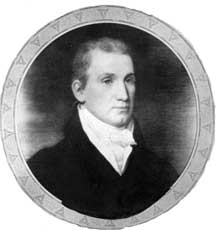
Monroe
The Monroe Doctrine was meant to dissuade the Spanish from attempting to recapture any of their former colonies in South America.
It stated: The American continents are henceforth not to be considered the subjects for future colonization by any European powers.
On June 19, 1822, the United States formally received the first representative from what was then called "Gran Colombia." Gran Colombia was made up of what later became Colombia, Panama, Ecuador, and Venezuela. This was the first of the South American nations to declare their independence from Spain and become recognized by the United States. Soon after, the other newly free South and Central American states, with the exception of Black Haiti, were also recognized by the U.S. (Abraham Lincoln recognized Haiti in 1862.)
During the summer of 1823, there were rumors that Spain might attempt to regain her colonies in South America, possibly in alliance with Russia. The United States was concerned about such a possibility, and so were the British. The British foreign minister suggested that the United States and Great Britain issue a joint declaration warning the European powers not to intervene. President Monroe consulted with leaders of Congress and the former Presidents, who recommended he proceed with a joint declaration. However, Secretary of State John Quincy Adams opposed the joint statement, believing that if the United States issued the declaration by itself, it would show that the United States was now strong enough to stand alone. It was also important to Adams, who had presidential aspirations, to demonstrate that he, a New Englander and former Federalist, did not have any special affection for the British. Adams' view prevailed, and Monroe decided to issue a warning without the British. Monroe issued the declaration of American principles as part of his annual address to Congress. By then, the immediate crisis had passed, but the doctrine became an important factor in American foreign policy for the next 150 years.
The Monroe Doctrine had three components. First, it stated that the areas of North and South America were no longer open to European colonization. Second, it declared that any involvement in the affairs of the Americas by European powers would be considered “dangerous to the peace and safety of the United States." Third, it stated reciprocally that the United States would not get involved in the affairs of Europe.
The Monroe Doctrine marked an important milestone in American foreign policy. It demonstrated that the United States was a major player on the world stage, one that could not be ignored. The Monroe Doctrine was used as late as the 1980s to justify American involvement in parts of Central America.
Mahan's Explanation on the meaning of the Monroe Doctrine
 >
>